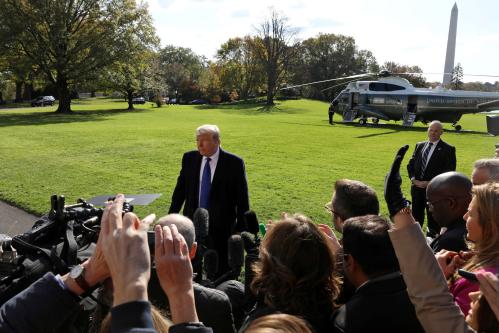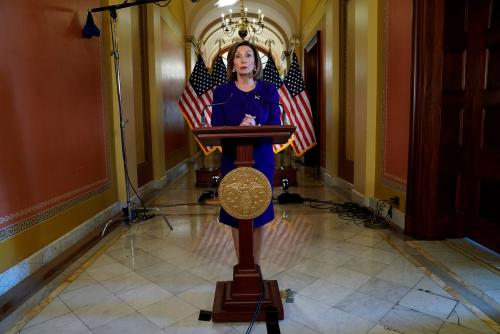Last week the House of Representatives ended its public presentation of the impeachment case. It included Ambassador Gordon Sondland’s bombshell testimony implicating everyone from the President to the Vice President to the Secretary of State in the effort to pressure Ukraine for a politically motivated investigation in return for military aid. They were merely “following the president’s orders.” The week ended with Russia expert Fiona Hill chastising the Republicans for latching onto a “fictional narrative propagated by the Russian security services.” And over the weekend it was revealed that Congressman Devin Nunes, (R-Calif.) allegedly met with Ukrainians as part of the effort to get dirt on the Bidens—a report that has prompted an ethics investigation.
While the impeachment hearings were playing out, a book called A Warning by Anonymous hit the newsstands and bookstores. It paints a devastating picture of President Trump: erratic, undisciplined, unable and unwilling to take in complex material, prone to abrupt shifts in policy and direction, and inclined to racist and sexist comments. His is a leadership style that is not just appalling in the presidency; it would get the principal of a small-town elementary school or the manager of a drycleaning business fired. Those behaviors send his employees, on a regular basis, scrambling to undo the worst ideas or to implement a half-baked idea. Internationally it strikes anxiety in our allies and spells triumph for our enemies. Things got so bad that one point the staff apparently considered a mass resignation in protest.
The author of A Warning is a White House political appointee and a lifelong conservative Republican. He or she points out that Trump has changed political parties five times in their lifetime—from the Independence Party to the Democratic Party to the Republican Party, then independent and back to Republican (p. 96). And many of Trump’s core beliefs are at odds with long-held tenets of the Republican Party that Anonymous believes should remain at the core of conservative philosophy, such as balanced budgets and free trade.
As reporters and reviewers alike have noted, there’s nothing really new in the book. This is intentional because too much specificity would make it easier to identify the author. But putting it all together paints a devastating picture. Trump’s belief that the conclusion of the American intelligence agencies regarding Russian intervention was fake news was especially troubling. “This bizarre reaction stoked fears,” writes Anonymous, “including within Trump’s circle, that he was somehow in Putin’s pocket” (p. 127).
And yet, neither the book nor the impeachment hearings themselves seem to be having an effect on Republicans in Congress, or in the country as a whole, who support Trump. Republicans remain loyal to this most unorthodox president.
The question is, why?
The conventional wisdom is that congressmen and senators fear electoral consequences. Because the vast majority of Republican members of Congress come from safe districts and states, the only thing they have to fear is that they will be “primaried” by a Trump supporter who runs against them in a Republican primary. When Steve Bannon was in the White House he vowed to recruit candidates in Trump’s mold to run in Republican primaries. The strategy never got off the ground, and Bannon quickly ran afoul of Trump and was out.
But this fear may be overblown. When Bannon left, Trump lost the sort of strategic mind necessary to turn Trump into Trumpism. Given the leadership style chronicled in A Warning there is little evidence that Trump has the ability or discipline to build the kind of political organization that would systematically punish wayward Republicans.
As for the public, the base strategy that Trump has used throughout his presidency seems to be working. Trump has steady support among Republicans. His approval ratings remain where they’ve been—albeit in the low forties—and polling on impeachment and removal haven’t shown any weakening in Republican support. But just as fears of being “primaried” may be overblown, the base strategy may be erroneous. When put to the test—i.e. in actual elections—the base strategy has shown its limitations. The 2018 midterm elections and the 2019 special elections demonstrated that when a highly polarized and mobilized Republican Party met a highly polarized and mobilized Democratic Party, the Democrats won.
There are not many shoes left to drop. The investigation process is pretty much over. The House Intelligence Committee will draft a report this week and then the action moves to the Judiciary Committee. A vote could come before Christmas. Perhaps former national security advisor John Bolton will testify now that he has a multi-million-dollar book deal in hand. Perhaps the Supreme Court will decide that Trump needs to release his tax returns. But if past is prologue, neither is likely to shake loose the Republican base in the short run. The long run, November 2020, is an entirely different matter.
This work is licensed under the Creative Commons Attribution-NonCommerical-NoDerivatives 4.0 International License. To view a copy of the license, visit https://creativecommons.org/licenses/by-nc-nd/4.0/.
The Brookings Institution is committed to quality, independence, and impact.
We are supported by a diverse array of funders. In line with our values and policies, each Brookings publication represents the sole views of its author(s).








Commentary
Republicans backing Trump: This week in impeachment
November 25, 2019